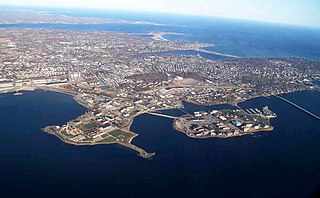
Naval Station Newport is a United States Navy base located in the city of Newport and the town of Middletown, Rhode Island. Naval Station Newport is home to the Naval War College and the Naval Justice School. It once was the homeport for Cruiser Destroyer Force Atlantic (COMCRUDESLANT), which relocated to Naval Station Norfolk in the early 1970s. In 1989 the base was added to the National Priorities List, after contamination had been discovered years earlier. Newport now maintains inactive ships at its pier facilities, along with the United States Coast Guard and National Oceanic and Atmospheric Administration research vessels. In BRAC 2005, NAVSTA Newport gained over five hundred billets, in addition to receiving, again, the Officer Candidate School (OCS), the Naval Supply Corps School, and several other activities, to include a few Army Reserve units.

The surface warfare insignia is a military badge of the United States Navy which is issued to U.S. Navy personnel who are trained and qualified to perform duties aboard United States surface warships. There are presently four classes of the surface warfare pin, being that of line, staff, special operations, and enlisted. The line and enlisted surface warfare badges may be earned by United States Coast Guard personnel assigned to Navy commands. The various badge types are as follows:

The United States Navy's Center for Information Warfare Training (CIWT) is one of the learning centers of Naval Education and Training Command, headquartered on Naval Air Station Pensacola Corry Station in Escambia County, Florida. It is responsible for the development of education and training policies for over 26,000 members of the Information Warfare Corps in the fields of cryptology and intelligence, along with the cyber realms of information operations and technology, and computer systems and networks. The center also oversees Language, Regional Expertise and Culture.

The Transportation Corps is a combat service support branch of the U.S. Army. It is responsible for the movement of personnel and material by truck, rail, air, and sea. It is one of three U.S. Army logistics branches, the others being the Quartermaster Corps and the Ordnance Corps. The Corps was established in its current form on 31 July 1942, with predecessor services dating back to the American Civil War. The Transportation Corps is currently headquartered at Fort Gregg-Adams, Virginia. The officer in charge of the branch for doctrine, training, and professional development purposes is the Chief of Transportation (CoT) and Commandant of the US Army Transportation School, currently held by BG Beth A. Behn. The Corps's motto is "Nothing Happens Until Something Moves".
Staff colleges train military officers in the administrative, military staff and policy aspects of their profession. It is usual for such training to occur at several levels in a career. For example, an officer may be sent to various staff courses: as a captain they may be sent to a single service command and staff school to prepare for company command and equivalent staff posts; as a major to a single or joint service college to prepare for battalion command and equivalent staff posts; and as a colonel or brigadier to a higher staff college to prepare for brigade and division command and equivalent postings.
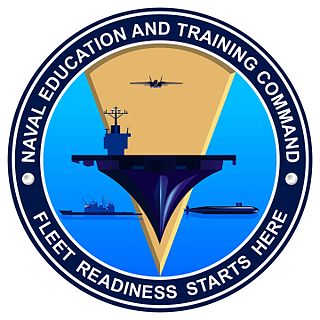
The Naval Education and Training Command (NETC) is an enterprise-level shore command of the United States Navy with more than 19,000 military and staff personnel at more than 1,640 subordinate activities, sites, districts, stations, and detachments throughout the world. NETC recruits, trains and delivers those who serve the nation, taking them from "street to fleet" by transforming civilians into highly skilled, operational, and combat ready warfighters.
The Indian Defence services have established numerous academies and staff colleges across India for the purpose of training professional soldiers in military sciences, warfare command and strategy, and associated technologies.
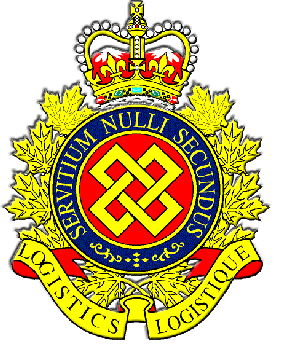
The Royal Canadian Logistics Service is a personnel branch of the Canadian Armed Forces (CAF).

Joseph D. Stewart, also known as "Joey D," was a United States Marine Corps major general, who after his retirement from the Marine Corps, was appointed as superintendent of the United States Merchant Marine Academy (USMMA) on August 1, 1998. He retired from the U.S. Maritime Service with the rank of vice admiral on September 30, 2008.
A direct commission officer (DCO) is a United States uniformed officer who has received an appointed commission without the typical prerequisites for achieving a commission, such as attending a four-year service academy, a four-year or two-year college ROTC program, or one of the officer candidate school or officer training school programs, the latter OCS/OTS programs typically slightly over three months in length.
In the Singapore Armed Forces (SAF), specialists are the group of ranks equivalent to non-commissioned officers in other armed forces. The term was introduced in 1993, for a more "positive" rank classification and shorter waiting time for Warrant Officers and Specialists (WOSPEC) career rank advancements. In the SAF, warrant officers are not considered specialists.

The Naval Safety Command (NAVSAFECOM) is an echelon II command of the U.S. Navy, established in its current form on 4 February 2022.
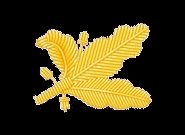
The Navy Supply Corps is the United States Navy staff corps concerned with supply, logistics, combat support, readiness, contracting, and fiscal matters.

The Naval Supply Systems Command (NAVSUP) serves as the supply command for the United States Navy for providing supplies, services, and support to both the Navy and the United States Marine Corps.

The United States Army Sustainment University is the Army's center of sustainment training for Department of Defense military and civilian personnel pursuing Professional Military Education (PME) and other associated training in military logistics and sustainment. The Army Sustainment University (ASU) has two campuses. The Somervell Campus at Fort Gregg-Adams, Virginia, delivers sustainment leader education for Quartermaster, Ordnance, and Transportation Soldiers and civilians. The Adams Campus at Fort Jackson, South Carolina, includes the Soldier Support Institute, which delivers Adjutant General and Financial Management leader education. ASU is a subordinate command to the United States Army Combined Arms Support Command, and is located at Fort Gregg-Adams, Virginia. The current President of Army Sustainment University is Ms. Sydney A. Smith, Senior Executive Service.

The logistics specialist (LS) is a US Navy enlisted rating that was created on 1 October, 2009 by the merger of the storekeeper (SK) and postal clerk (PC) ratings. It also included the previous functions of the former aviation storekeeper (AK) rating, which was previously merged into the former storekeeper (SK) rating on 1 January 2003.

All branches of the United States Armed Forces use the general term Enlisted Professional Military Education (EPME) to describe the formal system of education which each branch provides to its enlisted personnel. Each branch has its own system and sequence of courses, with the overall focus on leadership and management. Education generally increases in intensity and level of knowledge as individuals progress in rank and assume broader leadership roles. EPME is distinct from the technical training which service members receive for their Military Occupational Specialty (MOS), Air Force Specialty Code (AFSC), or Navy Rating.

William A. "Andy" Brown was a vice admiral in the United States Navy last serving as the director for logistics, J4 for the Joint Chiefs of Staff.
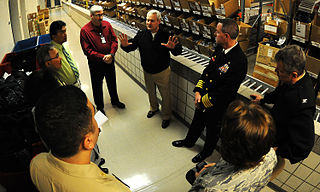
David Folk Baucom is a retired United States Navy Rear Admiral. Among Baucom's military roles were White House military aide to the president, director of the US Central Command Deployment and Distribution Operations Center in Kuwait, commander of Defense Logistics Agency Troop Support, commander of Fleet & Industrial Supply Center in Norfolk, Virginia, and strategy and policy director of the US Transportation Command. Baucom is currently senior director at Vintun LLC.

The Naval Officer Training Command Newport is a command unit of Naval Education and Training Command, located on Naval Station Newport in Newport, Rhode Island that is responsible to the Chief of Naval Education and Training for the development of civilians, enlisted, and newly commissioned personnel for service in the fleet as Naval Officers. Outside of the requisite physical readiness testing, the programs are academic in nature, and with the exception of the student enrolled in the Naval Science Institute or Officer Candidate School, personnel will come to Officer Training School having already received their commission or warrant.


















